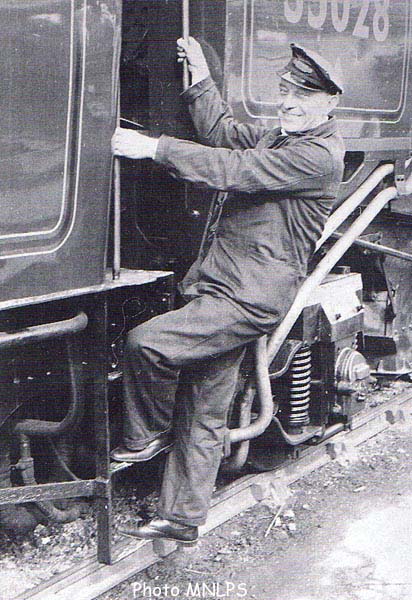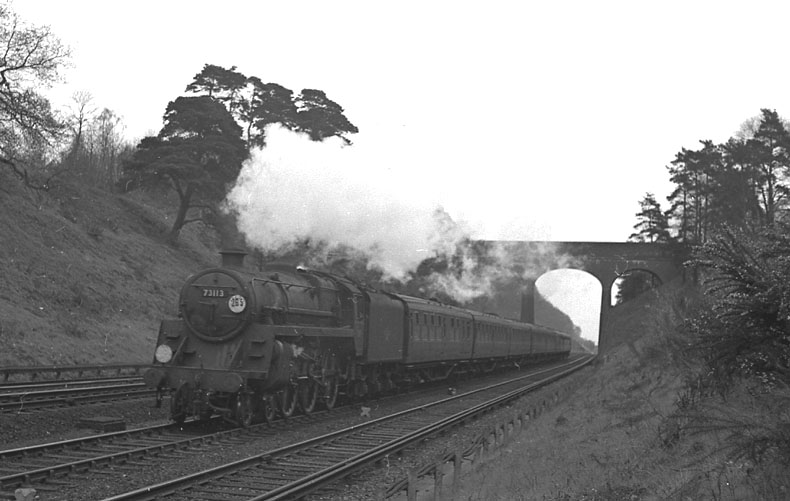
Alan Newman Nine Elms Engineman 1st January 1962 - 8th July 1967
Driver F Prickett - Locomotive Class 5 73113 Lyonnesse - Train 4.35pm Waterloo - Weymouth Fred Prickett seen here on the steps of MN, No. 35028 ‘Clan Line'. (Photo MNLPS) Nine Elms Top Link had some of the best drivers in the country. Fred Prickett was no exception. Fred was one of the most knowledgeable drivers at Nine Elms. I enjoyed being booked with him. He had great values and always had time to pass on his knowledge to youngsters like me. Fred had a presence that commanded respect from all he came into contact with. In 1966 I was in No 2 link my regular mate was Bert Hooker. A lot of the turns in No2 link were spare; this was to provide cover for the Top link which had no spare turns. The latest afternoon turn in the Top Link was the 4.35pm Waterloo - Weymouth, "The Royal Wessex" returning with the last Weymouth due back into Waterloo at 10.53pm. One afternoon in January 1966 I was shown on the daily alteration sheet to work the Down Wessex. I signed on at Vauxhall, where I was joined by my driver for the day Fred Prickett I was working vice Fred's regular fireman F. Davis who had leave on this day. I had worked with Fred a couple of times on tank engine duties; but this was my first trip with him on the main line to Bournemouth. We travelled passenger to Waterloo where we made our way to platform 11. We duly arrived at the top end of the platform and were greeted by Bill Cruise the running foreman. He told Fred that the booked Merchant Navy had failed at Nine Elms and the replacement engine was late off the shed. It was almost 4.31pm when the engine appeared on Westminster Bridge. I turned to Fred and said what we have got here (or words to that effect) as I realised a Class 5 standard was approaching. 73113 eased up onto the train and the fireman jumped off and coupled up. Fred and I stowed our bags away the driver told Fred that they had literally only got on this engine in the stores siding, at Nine Elms about 20 minutes ago. I had a look at the fire which was only just about covering the bars. Fred then had a look and asked me if I was happy? I replied it was not ideal but I had worked this engine the previous week with my regular driver Bert Hooker and she was ok, but on that occasion we only had a lesser load of nine coaches on. My only concern was if the back ash pan was clean. (The back ash pan being blocked seriously affected the steaming capability of the class 5's) The fireman assured me that he had indeed cleared the back ash pan before they left Nine Elms. Fred then said OK Alan just do the best job you can, and we will be just fine. I put the baffle plate in and then added a few cobbles under the door and back corners. The load was 12 = 403 tons with the first booked stop Winchester. We departed Waterloo about 7 minutes late; we had a full glass of water and about 220psi. Due to the state of the fire I had to start firing as soon as we were by west crossing. I had no idea how Fred was going to work the engine, except that I doubted he was going thrash the life out of it. Fred duly worked the engine in full first valve and 30% cut off. He shut off early and coasted through Clapham Jct with out having to brake for the 40 mph permanent speed restriction. Fred gave 73113 a bit of shake up after Clapham using the full second valve and 30% cut off. I had got her nice and hot and was easily able to maintain 225 psi with the water showing ¾ of a glass. The only word spoken between us was when Fred asked me not to let the water drop any lower in the boiler. I now resorted to firing over the half door; this meant I spent a lot of time using the coal pick to break up the larger cobbles of coal. The trick with these standards was keep them right on the red line, the maximum boiler pressure was 225psi but if they dropped back to 210psi they lost their sparkle, unlike the Bullied Pacific's which would still perform reasonably well with only 180 psi. After passing Surbiton Fred reduced the cut off to 25% and worked her with the regulator just cracking the second valve. From my point of view we seemed to be making slow progress, so I was little surprised when passing Woking, Fred announced we had made up two minutes of time since leaving Waterloo. Fred duly worked 73113 a little harder from Woking, and then at Farnborough it was back to 25% cut-off and a touch of the second valve for the regulator.
The engine was buzzing I had never experienced a trip like this on a standard, it was like a dream. The good run continued with no adverse signals all the way to Basingstoke and on through to Worting Junction. After passing Micheldever Fred eased the regulator using just the first valve, but left the cut off at 25%. We arrived at Winchester spot on time having recovered 7 minutes. The remainder of the trip to Southampton and Bournemouth was done with out fuss and we arrived at Bournemouth on time. I probably made more use of the coal pick, and shovelled more coal with 73113, than I would have done if we had the booked Merchant Navy. All said, that was the most satisfying trip I have ever had with a class 5 standard. Copyright ©2009 Alan Newman
Brian Aynsley has written: I only knew Fred for about three years, when I tandsferred to Nine Elms to get my driving job in 1964. I was a junior driver and he was a well respected senior man, so I never got to work with him, although I did talk with him about all sorts of things and found him very interesting. I was interested in Alan Newman's story about 73113 and the fact that the booked engine had failed at the depot.I heard a story that Fred was preparing an engine one day and found a problem with it, he was very precice when making his preparation checks. He said that he would not take the engine out until the fault was rectified, so the running foreman told him to take the spare engine which was ready in the stores road. He made all his usual checks and when he was satisfied that all was well, he set off to leave the depot. Unbeknown to Fred, the storeman had been unloading some barrels of oil earlier in the day, using a block and tackle attached to the gantry in the stores road, unfortunately, he failed to put the block and tackle away when he was finished with it. When the engine had been prepared and backed into the stores road, the hook on the tackle finished up laying on the top of the tender and when Fred moved the engine, the hook caught on the tender rim and pulled the gantry down behind him. From what I was told, he was very cross about this incident and not a little embarressed. Does anybody else know exactly what happened?
|
|
Site sponsored/maintained by SVSFilm © 2009 ... Go to SVS Film Index Go to Nine Elms Main Index - "Light to Loco" |
